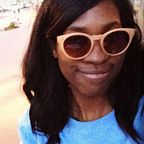What’s good, Medium? At the movies edition
11–7–2016
If you haven’t seen the movie Moonlight, you need to.
Mild spoilers.
David Malebranche explains the emotional power of watching two Black men on screen together:
As a Black same gender loving man watching Marcus and Darby’s lips part and lock in a sensual exchange, however, I realized that I had never seen two Black men share a moment of intimacy like that in a major motion picture before. Black men who looked like me and my friends. Not oversexualized, fetishized soft core porn. Not hairdresser sidekick buffoonery. Not the ubiquitous gay interracial romance mandated by a studio so that a film may be green-lit.
These were two handsome, beautiful brothers, kissing on a movie screen in a crowded New York theater. Passionately. Unapologetically. Lovingly.
They were kissing the same way I have kissed my partner when we couldn’t see anyone else on this earth but each other. The way I have seen my friends and colleagues kiss at social gatherings, weddings, and other events. The way many Black men have kissed other Black men because we innately connect with one another, not because we regard ourselves as consolation prizes when White men don’t feature us. The way many of us probe and explore the contours of our full, tender lips because loving ourselves is not always the revolutionary act it is purported to be.
Remember Mrs. Doubtfire? The family movie about a dad who just wants his kids back? Jaylyn Cook is here to ruin your entire day by reminding you that movie isn’t so wholesome after all:
This movie is basically a re-imagining of The Silence of the Lambs. Daniel is Buffalo Bill, Mrs. Doubtfire is his suit made of a woman’s skin, and Daniel is also Hannibal Lecter because he’s THAT weird of a dude. Not weird enough to eat people, but weird enough to go undercover for weeks (maybe even months) as a bootleg Mary Poppins.
In order to receive joint custody, all Daniel had to do was A.) get a job, B.) keep that job, and C.) create a decent living environment for himself — all within three months. This proves to be a lot tougher than Daniel, a grown man, expected, and he flounders immediately. If he really loved his children as much as he said he did, Daniel would have worked as hard as he could to make the best of his new arrangements. Instead, he almost instantly decides that he’s at the end of his rope (He’s not. He’s at the very beginning of his rope, if we’re going to be honest), sabotages Miranda’s search for a housekeeper, and assumes the role of Mrs. Doubtfire — who ultimately gets the job.
Why does he do this? Because he’s delusional. How do we know? BECAUSE HE DISGUISES HIMSELF AS AN OLD WOMAN TO STALK HIS OWN FAMILY. That is not cute. That is not clever. That is borderline psychosis. You don’t need to be a doctor to make that diagnosis.
The film Loving is a fictionalized account of the Supreme Court case that legalized mixed race marriage. Samiat Salami uses the film to break down the state of interracial coupling in America today:
Also, in post-Lemonade America, I will be another black woman to publicly admit this to white people: I am angry. I’m angry because a white woman in my neighborhood looked over her shoulders numerous times as I walked behind her. Then paused to ensure that I walked past her to give her some distance. All this happened while I was in yoga pants, carrying a yoga mat — an outfit that, if I was a white girl, would look as threatening as a Lululemon shopper on a juice cleanse. Because I, who has never committed a jail worthy crime in my life, am afraid of the police. Because my mother always gets ignored by cashiers at the Macy’s counter in Florida, where she lives. And because whenever I walk down the street with my white husband, I get ridiculous looks from people. Wouldn’t you be angry?
After watching Loving, it became apparent to me that to choose a black spouse is to give up a certain percentage of white privilege. It is to realize that you might have black children whose lives will be more difficult than yours, whose interactions with the police might be more severe. And if it is true that we as humans have a natural tendency to want to improve the lives of the generations that come after us, it is obvious why black people are not appealing as spouses. With the amount of work we have to do to find love in the technology-driven 21st century, who would seek out a more difficult life?
